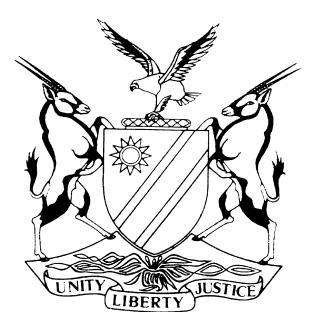
NOT REPORTABLE
CASE NO: SCR 2/2020
IN THE SUPREME COURT OF NAMIBIA
In the matter between:
THE STATE | |
and | |
TJARITYE MATINE | |
Coram: SHIVUTE CJ, MAINGA JA and FRANK AJA
Heard: IN CHAMBERS
Delivered: 28 July 2020
____________________________________________________________________
REVIEW IN TERMS OF SECTION 16 OF THE SUPREME COURT, ACT 15 OF 1990
____________________________________________________________________
FRANK AJA (SHIVUTE CJ and MAINGA JA concurring):
This is a review pursuant to s 16 of the Supreme Court Act.1 It arose in the following circumstances. The accused, Mr Matine, was arraigned in Okahao Magistrate Court on a charge of stock theft. He was charged with theft of three goats to the value of N$2400. He pleaded guilty to the charge and after being questioned pursuant to s 112(1)(b) of the Criminal Procedure Act (CPA)2 to ensure that he admitted all the elements constituting the charge, he was accordingly convicted.
After his conviction, the accused in evidence in mitigation indicated that he was single, 31 years old, illiterate, a father of one child, employed earning N$700 per month and suffered from eye problems. He stated in response to the questioning in terms of s 112(1)(b) that his motive for the theft was that he wanted money for ‘December and the new year to buy food’. All the goats were retrieved, so the complainant suffered no loss. The prosecutor submitted that a sentence of imprisonment of two years would be appropriate. The magistrate however sentenced the accused to 18 months imprisonment on 3 June 2019.
The matter was forwarded to the High Court pursuant to s 304 of the CPA as an automatic review. The High Court set the sentence aside and remitted the matter to the magistrate and in effect directed her to increase the sentence. In view of the manner this review found its way to this court, it can be assumed that the judgment of the High Court had not been given effect to yet.
The matter has been referred to this court by the Registrar of the High Court at the request of the judge who authored the judgment setting the sentence aside and directing a more severe sentence as this judge had been informed that the High Court did not have the power to increase the sentence where a matter came before that court on automatic review pursuant to s 304 of the CPA.
The issue surrounding the appropriateness of the sentence came about in the following circumstances. Section 14(1)(a)(i) of the Stock Theft Act3 prescribes a minimum sentence, unless there is substantial and compelling circumstances to do otherwise, of two years imprisonment where the value of the stolen stock is under N$500. However, where the value of the stolen stock is above N$500 no minimum sentence is prescribed. Not surprisingly the High Court had used the minimum sentence for the theft of livestock with a value of less than N$500 as a benchmark in sentencing people convicted of stock theft. Thus, to sentence someone who is convicted of stock theft where the value of the stock involved is N$4000 to a lesser sentence than a person involved in stock theft where the value is, say N$450 leads to an anomaly which cannot be justified as a general rule.4 The High Court was thus of the view that to sentence the accused to 18 months amounted to a wrong exercise of the discretion by the magistrate as this meant he was sentenced to a term of imprisonment that was lesser than that provided for in the Stock Theft Act for persons convicted of the same offence where the value of the stolen stock was much lower, ie less than N$500.
Whereas one has understanding for the reasoning of the High Court, s 304(2)(c)(ii) of the CPA does not confer the power to impose (or to direct the magistrate to impose) a harsher sentence on an accused person when a matter is forwarded to the High Court for an automatic review.5 The process of automatic review is to protect unrepresented accused persons who have no input in such reviews. The prosecution is protected by its ability to appeal where it is dissatisfied with a decision.
As the High Court acted outside the scope of its powers when it directed that the sentence be increased, its decision is bound to be set aside.
In the result, the following order is made:
The order of the High Court setting aside the sentence of the accused and directing the magistrate to impose a more severe sentence is herewith set aside.
The original sentence imposed on the accused of 18 months imprisonment on 3 June 2019 is reinstated and the accused (if in custody) shall be deemed to have commenced his period of imprisonment on 3 June 2019.
__________________
FRANK AJA
__________________
SHIVUTE CJ
_______________
MAINGA JA
4 S v Lwishi 2012 (1) NR 325 (HC) at 329.
5 S v Msindo 1980 (4) SA 263 (B), Attorney-General, Venda v Maraga 1992 (2) SACR 594 (V), S v Haashoek, S v November 1969 (1) SA 356 (E) at 361 C and S v Mzingeli & another, S v Renqe & others 1992 (1) SACR 615 (Tk) 617F-G.